According to a HubSpot survey, 41% of SEOs say building backlinks is the most difficult part of their job.
In today’s age, a multitude of link building software solutions promise to expedite and streamline this process. But how do you separate the gems from the junk?
Drawing on our extensive experience running a link building agency and having served 1,400+ clients and built tens of thousands of backlinks, we’ve evaluated 22 different link-building software options in this article.
We’ll dive into their features, use cases, ease of use, and overall value for money to help you identify the perfect tool(s) for you to make this difficult part of SEO a bit more manageable.
Let’s get into it.
Our Quick Top Picks
- Analysis: Ahrefs, Semrush
- Outreach: Pitchbox, Buzzstream
- Emails: Hunter.io, NeverBounce
- Free Tools: Google, HARO, MozBar, Check My Links
An Important Disclaimer
The tools on this list will give you an insane edge on the competition with regards to building backlinks and boosting your website’s authority.
However, link building is an intricate process that demands a deep understanding of SEO principles and the ability to consistently adhere to best practices.
If not done properly, it can lead to a lot of wasted money, subpar results, or even harm your website’s rankings.
A professional link building agency such as ourselves has the necessary experience and expertise to ensure the links are high quality, relevant, and built properly to avoid any negative consequences.
We’ve audited countless sites (and helped many recover) that had very amateur link building done previously that ended up causing lots of problems.
So please, proceed with caution if you are determined to do things on your own and are not an experienced SEO and link builder!
What To Look For In Link Building Software
At the moment, there still isn’t an all-in-one link building software solution, which means you will most likely want more than one tool.
The keyword in that last sentence is “want.” Depending on your situation, the correct choice could be to use no paid tools and opt to do it all yourself (takes time) or hire an agency (takes money).
Here are some of the things we’ll consider when evaluating the best link building tools:
- Features
- User-Friendliness
- Backlink Quality
- Customization
- Automation and Efficiency
- Integrations
- Reporting and Analytics
- Scalability
- Reputation and Support
- Cost
As there is no all-in-one solution, it’s important to measure all of these things in relation to what the tool helps you achieve.
Each of the tools we discuss will help streamline some of (but not all of) these processes:
- Link Prospecting
- Backlink/Domain Analysis
- Outreach and Relationship Management
- Content Promotion
- Backlink Monitoring and Management
- Competitor Analysis
- Reporting and Analytics
Also, please note that this list will not contain any “black hat” tools that are used to autogenerate spam backlinks in bulk. That is not the type of SEO we do, and we can’t recommend that you use such tools.
With that in mind, let’s start looking at the software!
Ahrefs
We really enjoy using Ahrefs for our link-building work, and it’s one of the most popular link-building tools used by SEO agencies. Ahrefs is awesome for helping build new links, and it’s a tool we wouldn’t want to be without.
One of the best things about Ahrefs is its big database of links. It lets us quickly check our competitors’ links and find new chances for link-building. Looking at their strategies, we can copy their success by making similar high-quality links for our own websites.
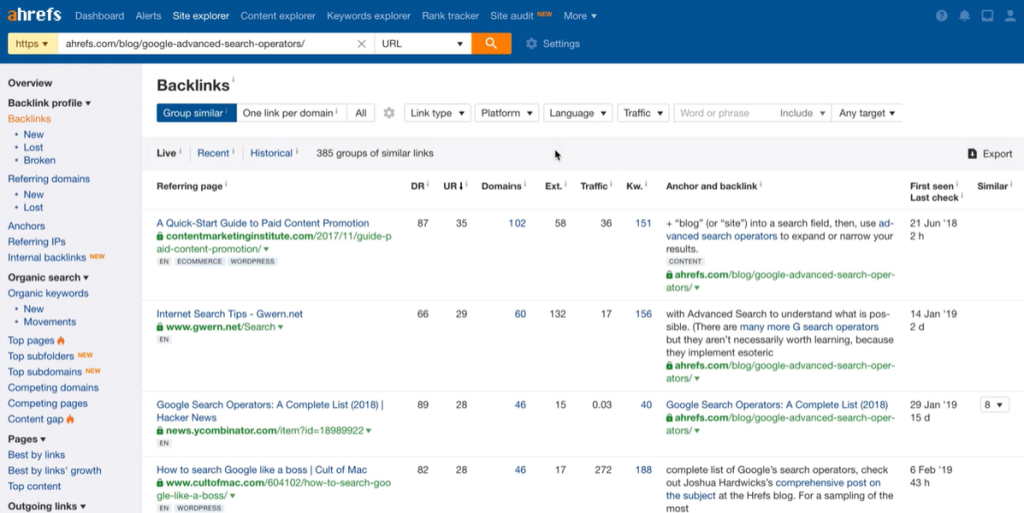
We also like Ahrefs’ Content Explorer because it helps us find the most popular content in our niche. Seeing what content is successful, we can make our own high-quality content that will draw in links over time. We can also ask websites that link to similar content to link to ours.
Ahrefs also has the Link Intersect tool that shows us websites that link to several of our competitors but not to ours. It’s a great place to start when planning our link-building work because it helps us find websites that are likely to link to our content.
And, of course, we haven’t even mentioned all the SEO metrics Ahrefs allows you to check, like DR (Domain Rating), Traffic, Organic Keywords, Referring Domains, and so on.
Also included is the SEO Toolbar (which is essentially a paid version of MozBar that we prefer due to using Ahrefs metrics).
The downsides to Ahrefs are:
- Its price (especially with the recent changes).
- Nothing to help manage outreach.
You can start for $83/mo for an annual plan, but you’ll most likely need a larger plan if you use it a decent amount.
All in all, Ahrefs has been a key part of our link-building work (and SEO in general).
And it’s many more capabilities than those we mentioned here like keyword research, the ability to reverse engineer a million different things, broken link building, and so on.
BuzzStream
BuzzStream is a popular link building tool that helps you build backlinks by managing your outreach processes.
It would be hard to imagine doing outreach at scale without a tool like this.
One of the best things about BuzzStream is how it helps manage contacts. It lets you keep track of potential link targets, including their contact info, social media, and past interactions. This can be really useful when doing outreach, as it lets you tailor your approach and build relationships.
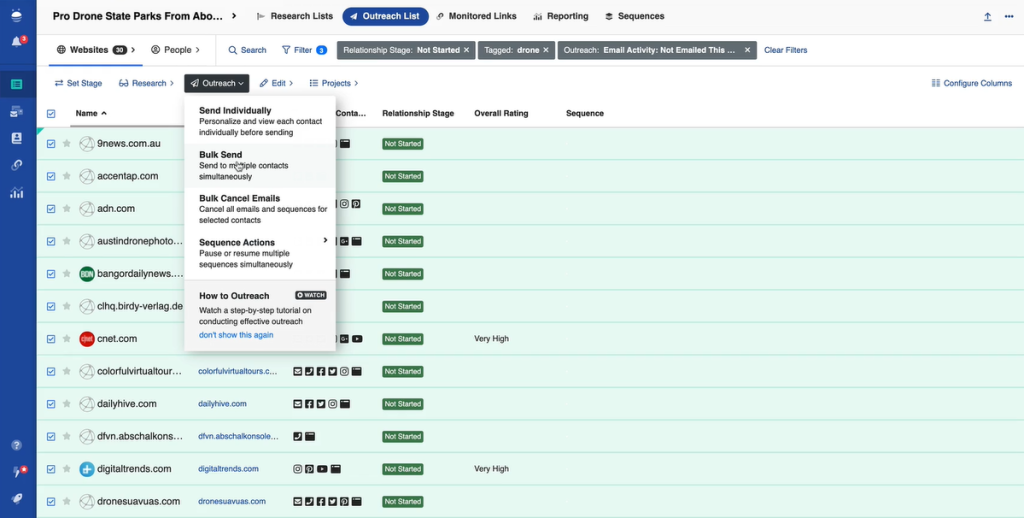
BuzzStream’s Email Management feature is also awesome. It lets you send custom outreach emails and follow-ups right from the tool, making communication much easier. The built-in email tracking also lets you see how well your outreach is doing, including opens, clicks, and responses. We’ve been able to get much better results by paying attention to these numbers and making adjustments.
We also like the advanced search feature. It helps you find new link-building opportunities by using Boolean searches to find relevant websites, bloggers, and influencers in your niche.
BuzzStream also works with other SEO tools like Ahrefs and Moz to pull in all the information you need to help make decisions about websites.
A couple of cons:
- Limited analysis features.
- You’ll still want a tool like Ahrefs or Semrush.
- Limited reporting.
Pricing starts at $24/mo.
In short, BuzzStream is a great tool for businesses wanting to improve their link-building strategy through better outreach and relationship management. Its features are specifically designed for link-building campaigns, making it a valuable tool for any organization trying to get a boost in organic search.
BuzzSumo
BuzzSumo is a great content marketing and SEO tool that helps discover and analyze top content, giving you helpful insights for our backlink strategies.
BuzzSumo shows the most shared and linked-to content in your field (like Ahrefs’ Content Explorer). Knowing what kind of content is popular and gets links, you can create similar, relevant content that naturally attracts backlinks.
BuzzSumo’s Influencer tool is something else that stands out. It helps you find and connect with important figures and authoritative websites in your niche, who you can then build relationships with and (hopefully) score a link placement from!

The Alerts function in BuzzSumo is also helpful for link builders. It lets you keep track of new content and backlinks for specific keywords, competitors, or domains. With this information, you can stay aware of new trends and opportunities and quickly go after link-building targets as they come up.
Being able to export and analyze data in BuzzSumo is another helpful feature for link building. With detailed information on content performance and backlink profiles, you can make informed decisions about your strategy.
Some things we don’t like:
- Limited backlinks analysis features compared to some other tools.
- Pricing could be expensive for some.
Pricing starts at $95 per month for an annual plan, but there is also a 30-day free trial.
All in all, BuzzSumo is another powerful tool that would be welcome on any link building campaign!
Check My Links
Check My Links is a useful and easy-to-use browser extension. It checks the health of links on any webpage, which can help you spot link-building opportunities and improve your outreach work.
Not to mention… it’s free.
With a few clicks, you can check any webpage for broken links or invalid links. This is especially helpful when looking at resource pages, industry directories, or blogs in your niche.
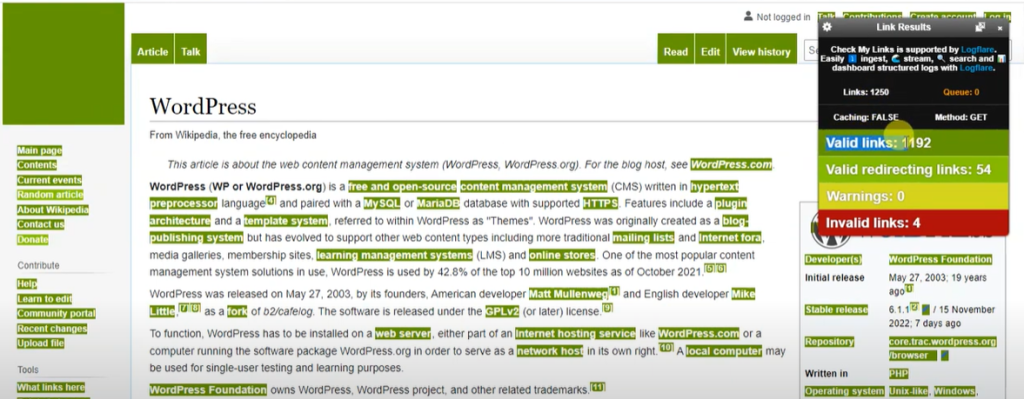
After finding some broken links, you can reach out to the website owners to notify them and ask them to replace the broken links to your site.
Check My Links is also great for keeping your website in good shape and making sure all your links work properly. Fixing or updating any broken links improves the user experience and is also a signal to Google that it’s well-maintained.
The cons:
- Lacks the deeper functionality of many other tools on this list.
It feels to write cons about free link building tools, though. Anything more, and they’d have to charge you for it! It’s simply a great tool for broken link building.
cognitiveSEO
CognitiveSEO is a flexible, all-around link building tool we’ve found very useful for link prospecting (and much more).
We’ll start with the detailed backlink analysis the tool offers. With lots of data on the backlinks of your website and your competitors’, you can find good link opportunities and plan a specific link-building strategy.
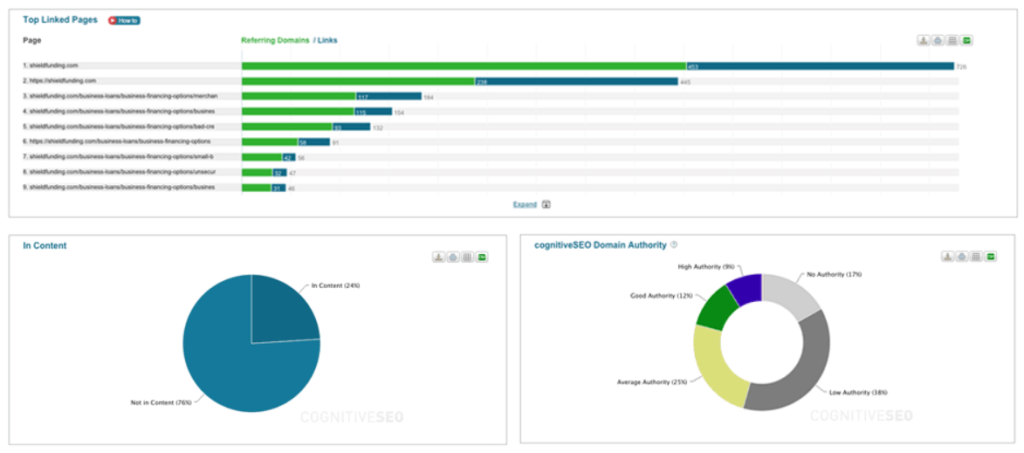
Plus, cognitiveSEO’s visual Link Navigator tool helps you understand these backlink connections easily.
Another handy part of cognitiveSEO is the Instant Backlink Explorer. It lets you quickly analyze any website’s backlink profile without setting up a campaign. This can be great for finding potential outreach targets and checking the quality of their backlinks.
CognitiveSEO also has a link-building feature called the Unnatural Link Detection tool that helps you find possibly harmful backlinks. But to be honest, we aren’t fans of the feature or similar features on other link building tools as it seems to scare people more than provide useful information.
Some things are better left to a human brain to analyze… for now.
This platform also works with tools like Google Analytics and Search Console, which boosts its analysis abilities.
The cons:
- No features to manage outreach.
- Competes with some of the better-known tools in the industry.
Pricing starts at $89 per month for an annual plan, and they also have a 7-day free trial.
Be sure to check out cognitiveSEO If you’re looking for a powerful tool and to give something else a try!
So it turns out you can use Google’s many free tools to help build links, and if you aren’t, you should be!
One top Google tool for backlink analysis is Google Search Console. Specifically, the Links report shows data on your website’s links. This lets you see which websites are linking to your content and find good backlink opportunities.
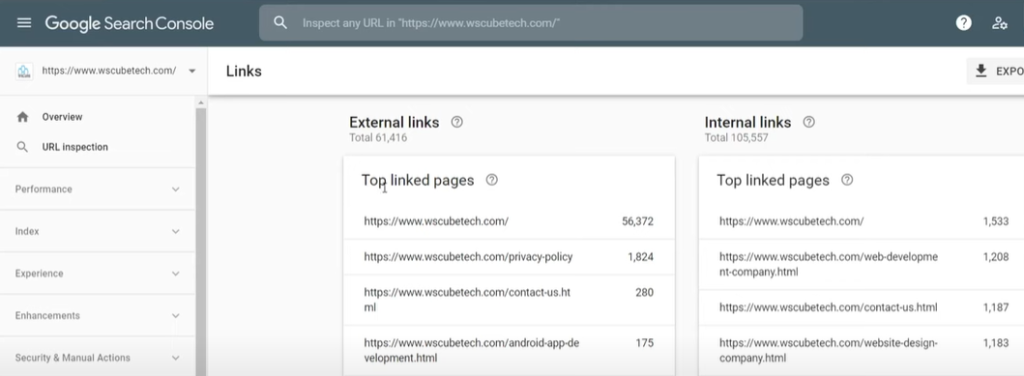
Another great tool is Google Analytics. Though it’s mostly used for looking at website traffic and user behavior, it can also be used for link-building. By looking at referral traffic, you can find out which external sources bring visitors to your website and what types of content sources like that prefer.
Google Alerts is another useful feature that keeps track of industry trends or mentions of your brand, products, or services. By watching these alerts, you can quickly find new link-building opportunities, like linking back to your content from mentions or joining in relevant industry discussions.
Also, Google search operators can help you find link-building targets. With advanced search techniques, like specifying search terms or filtering results by domain, you can find an unlimited amount of potential link partners.

The cons:
- It’s not built with building backlinks in mind.
- Lack of in-depth functionality that all paid tools have.
- No customer support.
But seriously, if you aren’t using Google to help build backlinks and do SEO in general, you’re missing out on the best hack out there.
There’s a ton more you can do with Google that we haven’t mentioned here, so open up YouTube and dive in to discover why Google might be the best link building tool there is.
HARO
Help a Reporter Out (HARO), now Connectively, is a useful platform that’s been amazing for our link-building and SEO efforts.
It’s a service that links journalists with industry experts, giving businesses a chance to get high-quality backlinks from authoritative sources and boosting their credibility and online presence.
Using HARO is easy. You sign up, choose your areas of expertise, and then receive daily emails with a list of queries from journalists who need knowledgeable sources for their articles. Responding to these queries with relevant, helpful info or insights can help get you featured in their articles.

And if you’re featured in the article, you guessed it – there’s a very high chance you’ll be getting a backlink (usually to your homepage with your name or brand as the anchor text).
Did we mention it’s free?
The websites you can get links from with HARO can be insanely powerful, but the links are often nofollow.
Another perk of using HARO is that it can enhance your brand’s image and credibility. Being featured as an expert in respected media publications not only strengthens your reputation but also helps you differentiate yourself from competitors in your industry.
Last but not least, the networking potential of HARO is important too. Building relationships with journalists can lead to future collaborations and more backlink opportunities as journalists turn to you for insights when writing articles in your industry.
The cons:
- Have to be fast to reply.
- Can be hit or miss with getting backlinks.
- Harder for certain niches.
- More difficult now with people spamming inboxes with ChatGPT responses.
HARO is another one of those things we just can’t recommend enough, even with the recent influx of replies. Use it.
Hunter.io
Hunter.io is a great tool we’ve been using to find and verify emails, which is key for our link-building efforts.
It simplifies the task of finding valid email addresses of potential link partners, letting you connect with the right websites and industry experts more effectively.
The best thing about Hunter.io is how quickly it can find email addresses linked to a specific domain or company. All you have to do is type in the target domain, and you’ll get a list of available email addresses.

Another useful feature is the Email Verifier tool. This tool lets you check if an email address is valid before you use it for outreach. This increases the chances of your link-building efforts being successful and ensures you don’t send emails to invalid addresses.
The Bulk Email Finder feature is also useful for large-scale link-building campaigns.
Hunter.io can also be integrated with a number of CRM and Sales tools, like Salesforce and HubSpot if needed.
The cons:
- Limited features compared to some of the more robust tools out there.
- No outreach automation features.
You can try it for free or start at $34/mo on a yearly plan.
All in all, for what it does, Hunter is an amazing tool that we can highly recommend.
JustReachOut
JustReachOut is a helpful PR and link-building tool that simplifies the task of finding and connecting with journalists, bloggers, and influencers, making outreach campaigns targeted and easy to manage.

And it can do this based on your industry or keywords. Having this list of carefully chosen contacts lets you focus your outreach on quality prospects with (hopefully) higher-quality messages.
A feature that stands out to us on this platform is the Pitch Assistant. This tool guides you in creating personalized and compelling outreach messages that really engage your audience (though this has been made easier recently with ChatGPT).
Following the platform’s recommendations and best practices, you can refine your communication for better results.
JustReachOut also keeps you in the loop about the latest trends and content relevant to your keywords or industry, which can also help with your success rate.
The platform also keeps track of your outreach performance, giving you useful data to help tweak your strategy and improve your approach.
The cons:
- Higher price point for advanced features.
- More focused on PR and media relations rather than SEO and link building.
The entry point is $80/mo on a yearly plan and includes a 14-day free trial.
It’s a solid platform, but its lack of SEO-related features might be a deal-breaker for some.
However, for those that like to go the route of hiring non-link builders to build links to further emulate natural backlink growth, this could be for you!
Link Prospector
Link Prospector helps build backlinks by simplifying the process of identifying high-quality, relevant link opportunities.
Link Prospector rapidly generates a list of potential link opportunities based on your target keywords, niche, or industry. This automation allows you to quickly locate relevant, high-quality link-building opportunities, such as blog posts, resource pages, directories, and more.

This platform offers a variety of report types. Depending on your link-building objectives, you can generate reports for activities like guest posts, link pages, content promotions, and even find potential influencers within your niche.
It can also categorize and prioritize link prospects by examining metrics such as domain authority, relevance, and link quality.
Link Prospector is also designed to integrate seamlessly with other link-building and outreach tools, such as BuzzStream and Citation Labs’ own Link Building Tracker, allowing you to easily manage and monitor your link-building campaigns.
The cons:
- Feels quite limited compared to some other tools.
- Higher pricing for more use or additional features.
- Nothing for outreach.
Link Prospector starts at $5 per credit, which means you can take it for a spin very cheaply, however the base monthly plan starts at $47/mo.
How you feel about this tool will probably depend on your budget. For some, the entry point might be great, while others might need a more robust feature set.
Linkody
Linkody is a tool that we’ve found to be great for tracking and managing our link-building campaigns.
It helps by providing helpful data on your backlink profile, keeps you updated on your new and lost backlinks, gives insights into your competitors’ link building strategies, and more.
The big pull for Linkody is that it automatically monitors backlinks. Tracking your website’s backlinks can take a lot of time, but Linkody makes it simpler by constantly monitoring and sending updates about new or lost backlinks.
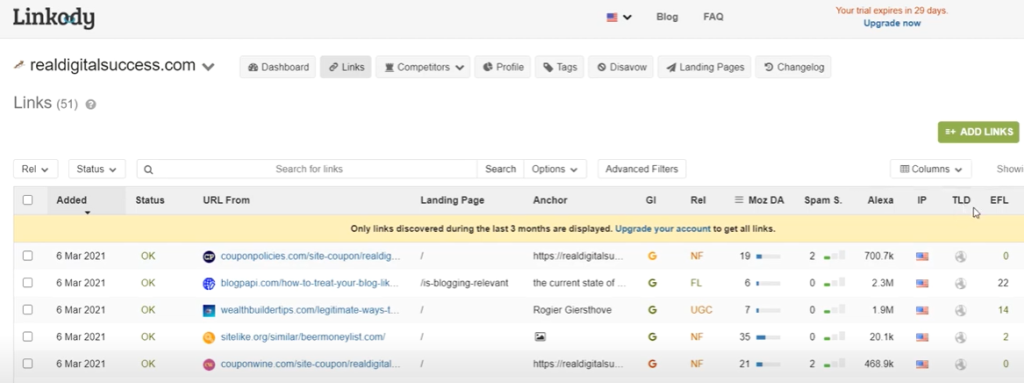
Its backlink analysis feature provides lots of information about your backlinks, such as domain authority, referring domains, and anchor text, which helps you assess the quality and relevance of your link partners.
Linkody also lets you monitor your competitors’ backlink profiles which gives insight into their strategies and can reveal potential link-building opportunities for you.
Linkody can also be integrated with tools like Moz and Google Analytics.
The cons:
- Analysis features are more limited than some of the other more robust tools.
- Nothing to manage outreach.
Pricing starts at $11.20 per month on an annual plan for 500 monitored backlinks, and they also have a 30-day free trial.
In short, Linkody is a top-notch tool for tracking backlinks and doing some analysis, but depending on your needs, you might need to augment it with other tools.
Mailshake
Mailshake is a user-friendly tool that’s great for email outreach and automation. It simplifies sending personalized outreach emails, making it easier for you to conduct link-building campaigns.

Mailshake’s main perk is how easy it is to create and customize email campaigns. You can use pre-existing templates or create your own to craft personalized outreach messages that are more likely to land you some nice backlinks.
There’s also an automated follow-up feature that ensures your outreach efforts are consistent and timely, and everyone (hopefully) knows how important following up is for link building. You can set up custom triggers and personalization tokens to streamline this even more.
Mailshake also has features for analytics and reporting that give you insights into how well your outreach campaigns are doing. This data on email opens, clicks, and responses allows you to make necessary changes.
It can also integrate with many CRM, sales tools, and email providers.
The things we don’t like:
- Limited SEO-specific features.
The entry point is $58 per month but requires an annual plan.
Mailshake is a great option for outreach automation, but its lack of SEO-related features is definitely something to keep in mind.
Majestic SEO
Majestic SEO is a useful tool for backlink analysis and link-building that also does much more, like Ahrefs and Semrush.
Majestic SEO has a big backlink database that gives you access to a ton of link data, so you can look at your own backlink profile and your competitors’, which can give you great insights and help you find potential link-building opportunities.
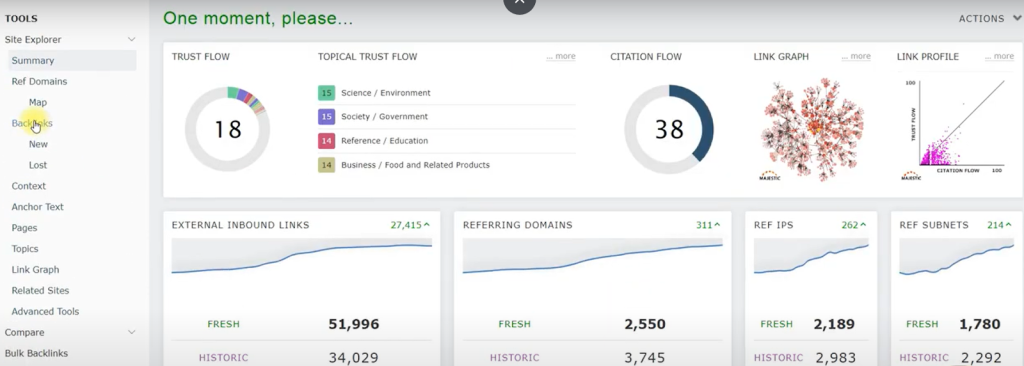
Majestic’s Trust Flow and Citation Flow metrics are some of the main pulls for this platform. These metrics give you an idea of how trustworthy and influential a domain is, so you can evaluate the quality and relevance of potential domains to get backlinks from.
Majestic SEO’s Clique Hunter tool is also great for finding potential link-building targets. It allows you to easily identify sites that link to several of your competitors but not you.
They also have several visual analysis tools like the Link Graph and Link Profile Fight, which can help you better understand and evaluate your backlink profiles.
The cons:
- Lacks some of the features of its rivals.
- Interface can be a bit of a mess.
- Nothing for helping to automate outreach.
You can get started for $41.67/mo annually, which can be seen as a plus compared to some of the other guys. They also have a 7-day money-back guarantee.
Majestic SEO is a powerful, feature-packed tool that’s great for link building and SEO in general, and it might be a good option for those who really want to use CF/TF for link research or a cheaper alternative.
Monitor Backlinks
Monitor Backlinks is another tool for helping to watch over your links instead of building links.
It keeps track of changes in your backlink profile and provides useful data on your existing backlinks, which lets you make smart decisions about your link-building strategy.
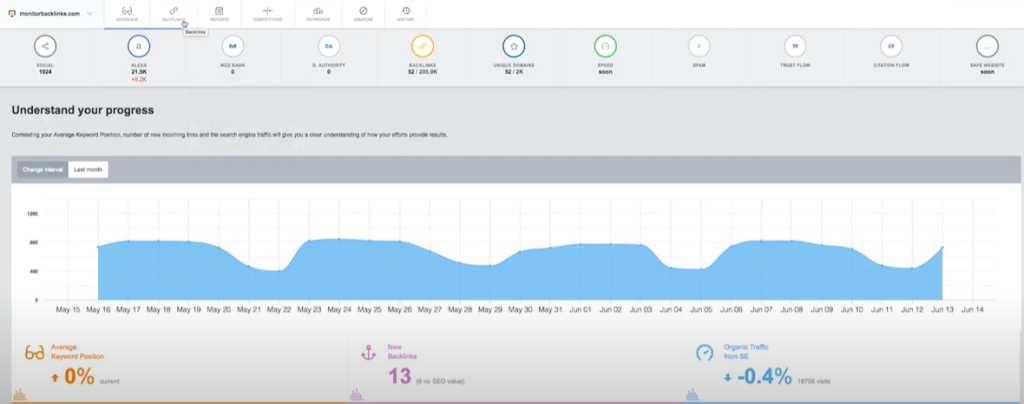
Like other backlink trackers, it’s main feature is that it automatically keeps track of your links. Getting notifications about your new or lost backlinks saves you from having to manually keep track of these changes.
Monitor Backlinks also provides a detailed analysis of each of your backlinks. It looks at important metrics like domain authority, anchor text, and the number of external links on a linking page, so you can evaluate the quality and relevance of your existing backlinks.
Monitor Backlinks also lets you track your website’s keyword rankings. This combined approach to SEO means you can see how your backlinks affect your search engine performance.
The platform lets you keep an eye on your competitors’ backlink profiles.
The downside:
- Limited reporting and analytics.
- Nothing to manage outreach.
- Will need to supplement with other tools.
Pricing starts at $20.75 per month for yearly plans, and they also have a 30-day free trial.
If you’re in the market for a backlink and keyword rank tracker, Monitor Backlinks could be worth a look!
MOZ Pro
Moz is a well-known, all-inclusive SEO tool similar to Ahrefs and Semrush that’s been around since the dawn of SEO.
It offers loads of advanced features and useful data, which help businesses create focused and effective link-building strategies.
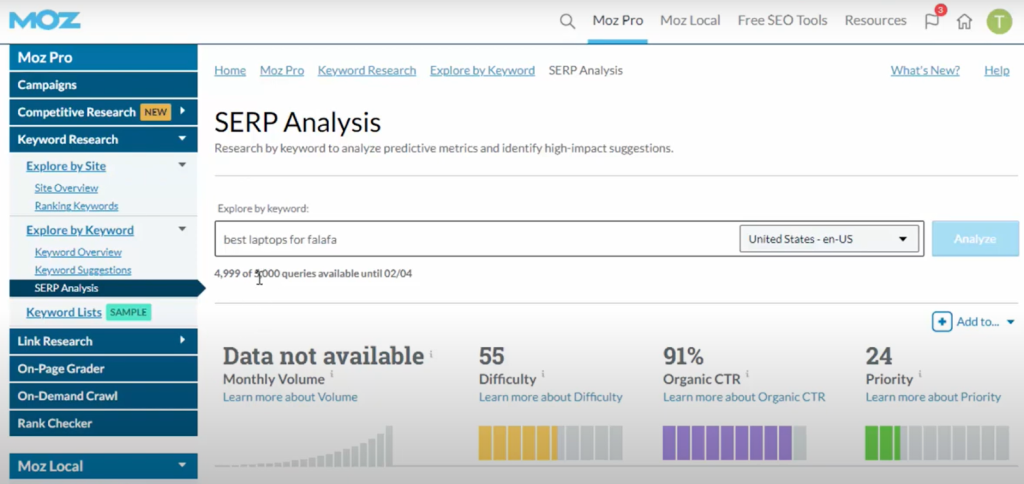
One of Moz’s top features for link-building is the Link Explorer. It provides access to a big database of backlink data, letting you analyze anyone’s backlink profile.
Another great feature of Moz is the Keyword Explorer. This tool is mainly for keyword research, but it can also help with your link-building efforts by finding top-performing keywords in your niche and creating content around them.
Moz also offers its free MozBar browser extension. This plugin shows metrics like Domain Authority (DA), Page Authority (PA), and the number of backlinks right on the websites you visit and SERPs, and is a great tool even if you don’t want to pay for Moz Pro.
Many people pay attention to Moz’s spam score metric, but like with all spam score metrics, we haven’t seen a good one yet.
The cons:
- We’re not really fans of the DA/PA metrics when compared to some competitors’ metrics.
- Nothing to manage outreach.
- Might not have as much backlink/keyword data as some of the others.
The entry price is $79/mo annually, and they also have a 30-day free trial.
If you’re looking for an alternative to some of the other major players in this space, Moz is definitely a feature-rich platform that’s worth a look (and perhaps a free trial).
NeverBounce
NeverBounce is a helpful email verification tool that ensures your outreach emails hit the right inbox. This can be crucial for optimizing your campaigns and minimizing email issues.
It validates and cleans your email lists at lightning speeds, helping you maintain a high delivery rate. By removing wrong, non-existing, or outdated email addresses, NeverBounce significantly lowers the chance of bounces.
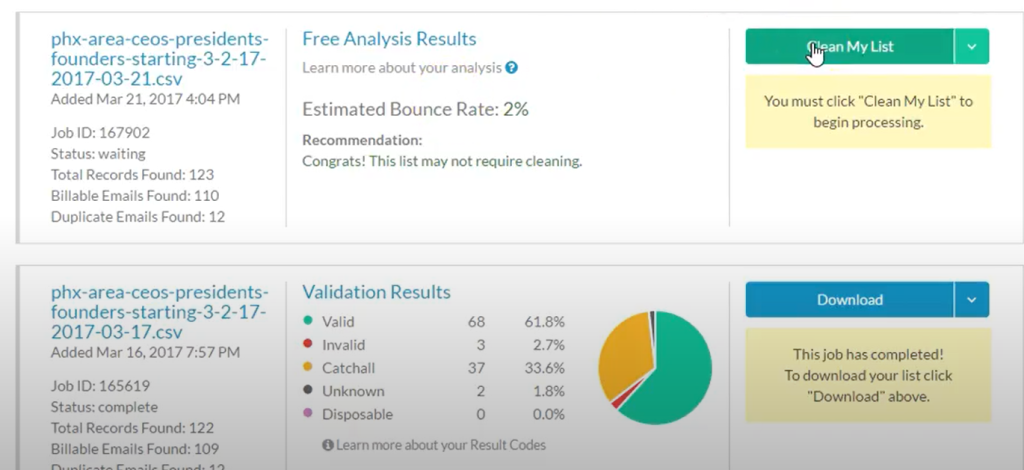
Its real-time verification tool validates email addresses as they’re added into your forms, keeping your email list fresh and up-to-date.
NeverBounce also has an easy-to-use dashboard where you can quickly see the overall health of your email lists and get detailed reports on the status of your email addresses.
And, of course, it can work with many popular email service providers, marketing automation platforms, and CRM systems.
The cons:
- Not much – it’s a specialized tool that’s great at what it does!
Pricing is tiered and gets cheaper with more emails. It starts at $.0008 per email for up to 10,000 emails.
If you’re looking to optimize your outreach campaigns by cleaning your email list and reducing bounces, give NeverBounce a look.
NinjaOutreach
NinjaOutreach is a complete and efficient outreach and link-building tool that helps automate and simplify the outreach process.
NinjaOutreach helps find relevant influencers, bloggers, and websites in your niche. The platform’s large database of contacts and advanced search options make it easy to find outreach targets that match your link-building aims.
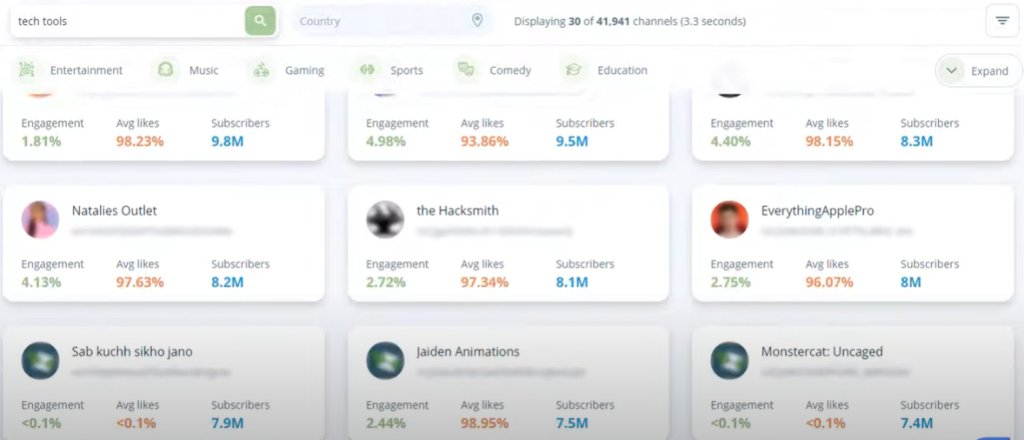
The email outreach features of NinjaOutreach include customizable email templates, automated follow-ups, and detailed campaign analytics, and you can create personalized, engaging outreach messages that connect with your target audience.
NinjaOutreach also makes it easy to find guest posting and content collaboration opportunities by finding relevant websites.
Moreover, NinjaOutreach works well with popular CRM systems and other productivity tools, letting you manage and track your outreach campaigns smoothly and within your existing workflows.
The things we don’t like:
- Built more for influencer marketing rather than SEO-specific link building.
- Lack of SEO analytics and functionality.
Pricing starts at $155/mo, but you’re also locked into a yearly plan (monthly plans are quite a bit more expensive).
Looking for an outreach automation tool and don’t need as much SEO-specific information? Check them out!
Pitchbox
Pitchbox is a monster of a link-building and outreach platform used by many of the pros.
With a suite of features for finding, reaching out to, and managing relationships with potential link partners, Pitchbox enables you to create targeted strategies for getting powerful backlinks at scale.
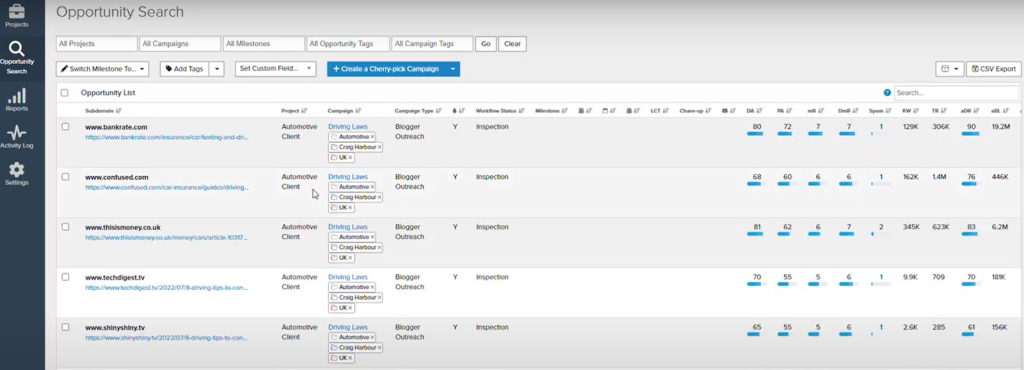
Pitchbox helps you find and qualify relevant link-building prospects using advanced search algorithms based on your target keywords or niche. By identifying websites, influencers, and content creators in your industry, you can focus your outreach on high-quality opportunities.
Its personalized email outreach features include customizable email templates, automated follow-up sequences, and tracking of key metrics like open and response rates so that you can optimize your outreach messages for the best results.
Pitchbox also offers an easy-to-use platform for managing and tracking your outreach campaigns. By putting all your communications, prospect data, and campaign analytics in one place, you can easily keep an eye on your outreach performance.
Pitchbox works seamlessly with a range of tools and services, such as Ahrefs, Moz, and Majestic, giving your outreach campaigns additional data on domain authority, backlink profiles, and more.
The cons:
- The pricing will be very expensive for smaller operations.
- Bit of a learning curve.
Pricing starts at $495/mo for an annual plan and 5,000 emails per month, and they offer a free trial.
Pitchbox is an invaluable tool for creating backlinks at scale. However, it might not be for you if you’re a smaller business, lack the budget, or don’t need to build so many links consistently.
Respona
Respona is another high-level outreach and link-building platform that’s been gaining in popularity.
It provides a collection of robust features for discovering, contacting, and managing potential link partners, helping you create boatloads of authoritative links.
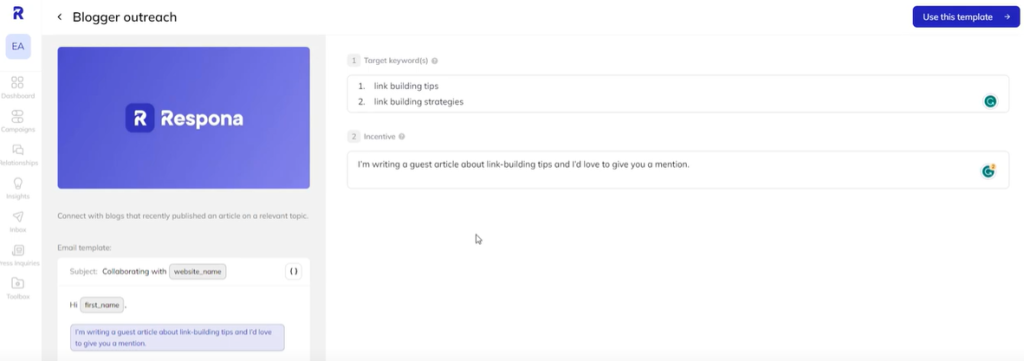
Respona helps you find and qualify relevant link-building prospects based on your target keywords and niche. With its content-driven prospecting engine, you can swiftly identify potential link partners, such as bloggers, influencers, and journalists, who have covered topics in your field.
Its personalized email outreach functionality comes with customizable email templates, automated follow-up sequences, and tracking of key metrics like opens, clicks, and responses.
Respona also has an intuitive inbox for managing and tracking your outreach campaigns, allowing you to easily monitor everything in one place.
The things we don’t like:
- Not much – it’s a great tool!
Its pricing starts at $99/mo for one email account and 5,000 credits, and they have a 14-day free trial as well.
If you’re looking for a cheaper alternative to PitchBox, Respona could be the answer for you!
SE Ranking
SE Ranking is a user-friendly backlink tracker and rank tracker that also has competitor analysis functionality, among other things.
Its ability to track your new and lost backlinks is an automated feature that keeps you updated on important changes, enabling quick action if necessary.
SE Ranking provides in-depth analytical insights, assisting you in evaluating the worth of potential backlinks and the backlink profiles of websites.
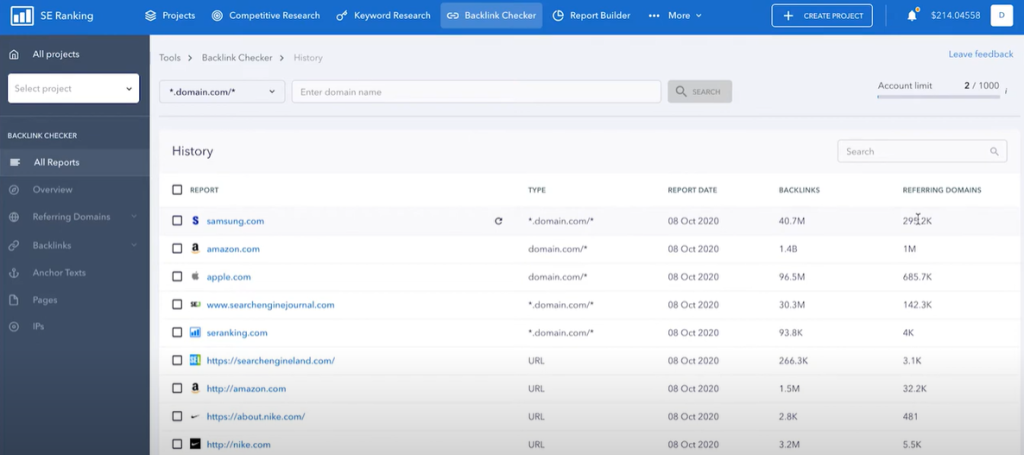
The software has robust filtering and sorting options, enabling you to customize results and focus on backlinks relevant to our SEO objectives.
SE Ranking also integrates with other popular SEO tools like Google Analytics and Search Console, enhancing its effectiveness.
The cons:
- Higher pricing for advanced features.
- It can feel clunky at times.
- Not as robust as some of the other tools.
- No outreach management tools.
You can get started at $31.20 per month on an annual plan, and they have a free trial as well.
All in all, SE Ranking can do a lot of things, but maybe not as well as some other tools. It does, however, have a pretty low entry price which might make it appealing for some.
SEMrush
Semrush is a robust SEO tool with many uses, similar to Ahrefs, Moz, and Majestic.
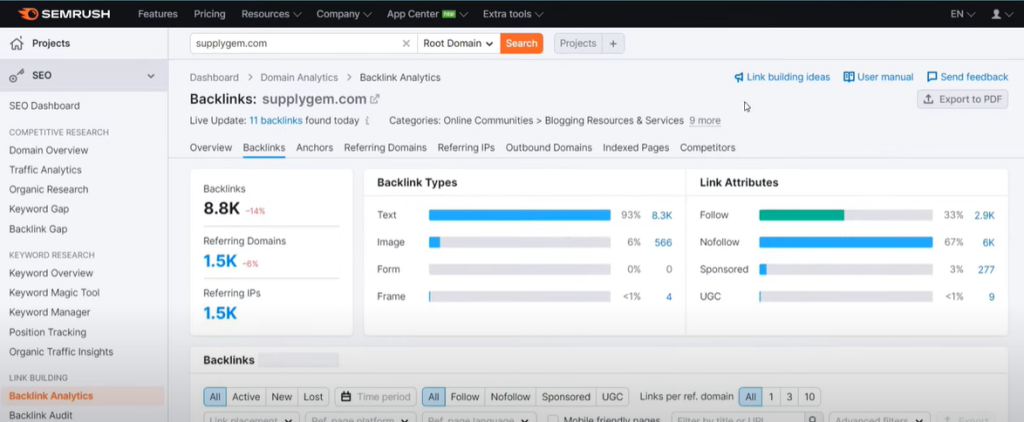
One cool feature is the Backlink Gap tool. This allows you to contrast your backlink profile with your competitors’, helping you spot valuable link-building chances you might have overlooked.
Another handy tool in Semrush’s kit is the powerful Link Building tool. It helps automate and simplify your outreach process by finding potential link-building targets based on your specified keywords or competitors.
Additionally, you can manage your outreach efforts right inside Semrush, making it convenient to track communications and measure your link-building campaign’s success.
The Keyword Magic tool in Semrush is also a great resource for link building that can help you discover keywords and generate content that naturally attracts backlinks.
Semrush has really gained in popularity due to feature updates as well as changes in Ahrefs’ pricing model, and it’s known for having better keyword data than Ahrefs as well (while the latter has better backlink data).
What we don’t like:
- Pricing can get steep.
- Backlink data isn’t as good as some competitors.
The entry price is $99.95/mo on an annual plan.
Overall, Semrush is a viable competitor to Ahrefs, and we really like that it has some outreach automation features. It’s definitely worth checking out!
URL Profiler
URL Profiler is a potent link-building tool that streamlines the collection and analysis of critical link-related data from multiple different platforms.
It has the capacity to quickly identify and collate in-depth backlink data for several URLs at once. This bulk analysis capability saves time and lets you spot patterns and trends to guide your link-building strategy.

It also offers detailed backlink metrics like domain authority, page authority, and the count of referring domains.
We also value URL Profiler’s content analysis feature, providing useful information on content-related metrics like word count, readability, and keyword density. Although it might not seem directly related to link building, creating shareable, link-worthy content is vital for successful backlink acquisition.
Lastly, URL Profiler integrates with popular SEO tools like Moz, Ahrefs, and Majestic, ensuring a well-rounded and seamless link-building experience.
The cons:
- Not as robust as some other tools.
- The UI is very basic and seems dated.
Pricing starts at $19.95/mo billed annually. A free trial is also available.
URL Profiler is more of a specialized tool for specific uses than some of the others here. If you need to pull data from multiple of the bigger tools at once for many links at a time, URL Profiler can definitely save you a lot of time!
Conclusion
Link building is an essential component of any successful SEO strategy, and leveraging the right software can significantly streamline the process. In this article, we have discussed many link building software solutions as well as our top picks.
To reiterate, our favorites are Ahrefs, Pitchbox, and any of the tools that were free (Google, HARO, etc).
Ahrefs excels with its comprehensive backlink/domain analysis and link prospecting features. Pitchbox, on the other hand, shines in its outreach and collaboration capabilities.
The free tools we’ve discussed offer excellent functionality without any financial commitment, making them great choices for anyone on a budget or those just starting out in link building.
However, it’s important to remember that the “best” software is often subjective, depending on your specific needs, budget, and overall business strategy. What works excellently for one company might not be as effective for another.
Hopefully this has been helpful, and good luck building some juicy backlinks with whatever powerful link building tools you decide on!
Frequently Asked Questions
What is link building software?
Link building software is a digital tool used to discover, manage, and track backlinks to your website, contributing to search engine optimization efforts.
How does link building software work?
Link building software helps you identify potential link opportunities, automate outreach to potential link partners, and monitor the status, quality, and impact of your backlinks.
Why is link building software important for SEO?
Link building software is important for SEO because link building is very important but can be very time-consuming.
What are the specific features to look for in link building software?
Key features to look for in link building software include backlink analysis, automated outreach, link tracking, competitor analysis, and more. See the earlier part of our article for more information.
What are the top link building software tools in 2023?
Our top link building software in 2023 are Ahrefs, Pitchbox, Google, HARO, and a few more free tools.
Can link building software guarantee better search engine rankings?
While link building software facilitates the link building process of acquiring and managing high-quality backlinks, it doesn’t guarantee better search engine rankings, as rankings depend on a broader array of SEO factors rather than just backlinks.
Are there any drawbacks or risks associated with using link building software?
Some drawbacks and risks with using link building software can include their cost, creating poor backlinks if used incorrectly, and becoming overly reliant on automation. You can’t be penalized for using the best link building tools we discussed here, but you can be penalized if you create an unnatural backlink profile that Google detects.
Is link building free?
Link building can be free if done manually, but the process is very time-consuming and requires a lot of SEO expertise. Free and paid link building tools can help streamline the process.
Is link building part of SEO?
Link building is a fundamental component of SEO. It helps increase your website’s visibility, authority, and ranking in search engine results.
Does link building still work for SEO?
Link building remains effective for SEO. However, the emphasis has shifted from quantity to the quality of links, with high-quality, relevant backlinks yielding the best SEO results. Also, we take a holistic approach to SEO, which means we focus on all areas of SEO rather than just backlinks.



